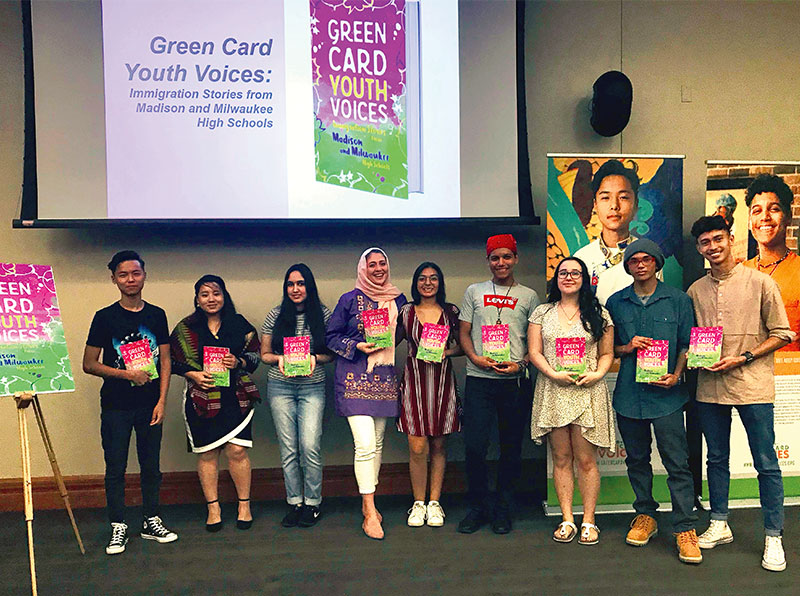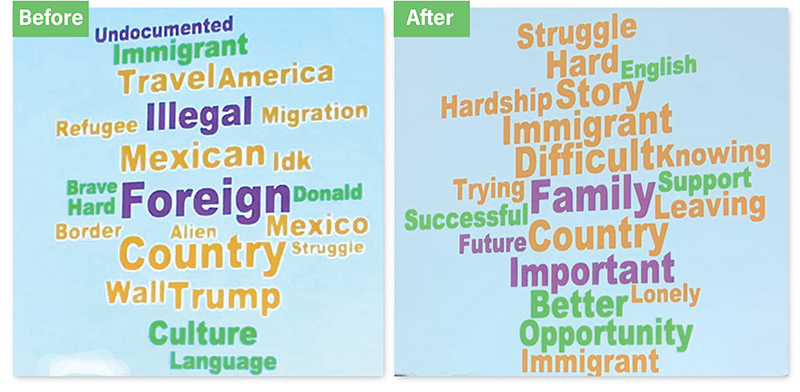All-School Read Makes Impact: Book by Young Immigrants Changes Perceptions at Wisconsin High School
A collection of personal essays by immigrants in high school empowers them and affects their peers.
 |
Student authors at Green Card Voices book launch party. |
Robin Amado was looking for a book for the second annual all-school read in 2018. Then the librarian at James Madison Memorial High School (JMM) in Madison, WI, Amado had helped organize the first event, in which students and staff read All American Boys by Jason Reynolds and Brendan Kiely and held discussions around the novel, which deals with racism and police brutality.
This time, Amado and her fellow organizers—teachers Leslie Mitchell, Cara Fitzgerald, and Kristin Voss—wanted a book about another issue in the news that impacted their students’ lives.
“We knew that, as a school, we wanted to talk about immigration in the school community,” Amado says.
They selected Green Card Youth Voices: Immigrant Stories from a Minneapolis High School, a publication of the nonprofit Green Card Voices, which records immigrants sharing their experiences in various cities and offers videos, books, and teaching guides to help people learn about their neighbors. The “Youth Voices” titles focus on schools; the Minneapolis book, the first in that series, features 30 students from Wellstone International High School, who came to the U.S. from 13 different countries.
The book choice led to greater understanding of the immigrant experience and prompted students to share their stories in a new “Youth Voices” book.
The Minneapolis-based Green Card Voices was formed in 2013 by a group of immigrants who “believed in the power of storytelling, but most importantly, we believed that immigrants need to step forward and start sharing our own stories,” says Tea Rozman-Clark, cofounder and executive director, who shared the story of the Madison high school at the SLJ Leadership Summit in September. Green Card Voices began to counter the negative narrative around immigrants and build empathy in their communities. That was exactly what the all-school read organizers wanted.
 JMM’s voluntary all-school read offered activities during lunch, after school, and in the evenings. Every student and staff member received a copy of the book, and some teachers used it with their classes. Green Card Voices provided some materials, such as a traveling exhibit featuring the stories of the students in the book. Events also included immigrant experience panels, author readings, and a story workshop.
JMM’s voluntary all-school read offered activities during lunch, after school, and in the evenings. Every student and staff member received a copy of the book, and some teachers used it with their classes. Green Card Voices provided some materials, such as a traveling exhibit featuring the stories of the students in the book. Events also included immigrant experience panels, author readings, and a story workshop.
“I was absolutely amazed. They created a lot of additional programming,” Rozman-Clark says.
About 25 student leaders helped plan and run the events. “It was really transformative for some,” Amado says. Students shared their own immigration stories as well, which, she says, “empowered them and gave them a voice.”
For those born in the United States, “I think many eyes were opened,” Amado says. For the first time, they heard from peers about what it was like to live in a war-torn country, or to have trouble understanding how a grocery store works.
The impact of the program could be seen in two word clouds Rozman-Clark created after the all-school read. Before students read Green Card Youth Voices, they used words like “illegal,” “foreign,” and “wall” to describe what they thought when they heard the word “immigrant.” Afterward, they used words such as “struggle,” “opportunity,” and “family.”

Rozman-Clark notes that funding for the project was provided by Forte, a Madison research firm run by an immigrant whose daughter attended the school. It was “a great example of how immigrants contribute in so many ways.”
Green Card Voices starts a “Youth Voices” project each fall and develops it over the course of the school year, from prepping the authors to recording and transcribing their stories to helping them write essays. They combined 13 JMM students with 17 students from Casimir Pulaski High School in Milwaukee for their fifth youth anthology, Green Card Youth Voices: Immigration Stories from Madison and Milwaukee High Schools, published in September.
 |
Tea Rozman-Clark |
Rozman-Clark said the response in both cities has been overwhelmingly positive. The Wisconsin Department of Public Instruction bought copies for all curriculum coordinators. The Milwaukee school board invited authors to share their stories at a meeting. Rozman-Clark said Green Card Voices has received requests to record in cities across the U.S. They focus on places with many immigrants but not many resources for people to learn about them, where “immigrant communities are experiencing some sort of backlash or lack of understanding or where bullying is up.”
The of the nonprofit is to help people understand “who they are and why they’re here, and how they wish and hope to contribute—and are contributing.”
The response to the books has been positive, Rozman-Clark said, and the need for the group has grown as the rhetoric around immigration has become more heated. “Oftentimes people would say, ‘It was important what you did before, but now it’s essential.’”
Currently, they’re working with Rochester and Buffalo, their first towns in New York state. They’ll begin recording students there in January, the executive director said.
Amado, who in April became a teen services librarian in the Madison Public Library system, says she’s hoping to help other schools to conduct their own all-school reads with the new book, and the library plans to use the Green Card Voices exhibit again in the future.
The all-school read “was one of the most fulfilling experiences of my career,” Amado notes.
Marlaina Cockcroft is a freelance writer and editor.
RELATED
The job outlook in 2030: Librarians will be in demand
The job outlook in 2030: Librarians will be in demand
ALREADY A SUBSCRIBER? LOG IN
We are currently offering this content for free. Sign up now to activate your personal profile, where you can save articles for future viewing





Add Comment :-
Be the first reader to comment.
Comment Policy:
Comment should not be empty !!!